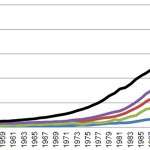New RI Health Care Law Barely Affected by ObamaCare Ruling
“Health consumer protection” sounds like an innocuous goal for legislation that Rhode Island Governor Lincoln Chafee signed into law last week. Of course, protecting some consumers via state mandates tends to increase the costs to other consumers, who might not feel quite so protected by the new statutes.
That zero-sum consideration may be the reason that the General Assembly’s press release on the legislation (linked above) emphasizes that it “establish[es] health insurance standards consistent with the standards established in the existing federal Patient Protection and Affordable Care Act of 2010,” as if the new mandates are merely local restatements of federal law already in place. It may also be why the lieutenant governor’s office made it sound, to Philip Marcelo of the Providence Journal, as if the new law didn’t commit the state to costly changes that may disappear at the federal level if the Supreme Court invalidates the Patient Protection and Affordable Care Act (PPACA) on Thursday:
Maria Tocco, spokeswoman for Lt. Gov. Elizabeth Roberts, whose office developed the bill along with Chafee’s office, said the law also was written in such a way that it would adjust, depending on how the U.S. Supreme Court rules on the federal health-care law.
Specifically, the legislation states that the certain parts of the act would not be enforced by the state in the event that the corresponding sections of federal law are repealed or found invalid.
A review of the language, however, shows this factor to be of very limited application. Of nine substantial provisions in the legislation, only two minor ones would go dormant if PPACA is ruled unconstitutional in its entirety. Those two are:
- Uniform explanation of benefits and coverage
- No annual or lifetime limits for “essential” services
If it stands, the latter provision may embed some unpredictability in Rhode Island’s health care market. Under ObamaCare, “essential services” are mostly defined at the pleasure of the Secretary of Health and Human Services (HHS), meaning that they could change with every administration and as a matter of executive policy, rather than legislative deliberation.
Of more effect on Rhode Islanders, however, are the seven provisions that are now a permanent part of the state’s health insurance regime whatever may happen to ObamaCare:
- Prohibition from excluding applicants with preexisting conditions, whereas only individual plans had that restriction, before
- Prohibition from ending members’ coverage except under narrow justifications, like fraud
- Required coverage of clinical trials and related routine services has expanded beyond cancer
- Provision of medical loss ratio reporting and rebates
- Coverage for emergency services inside and outside of the network
- Handling of obstetricians and gynecologists as “primary care” providers
- Increase of covered “child” age from 19 to 26, regardless of dependency, marriage, or residency
The RI Center for Freedom & Prosperity’s “Report Card on Competitiveness” places Rhode Island dead last in the nation for number of mandates (counting more as worse). With this legislation, the General Assembly and governor have ensured that, if the Supreme Court lifts the burden of ObamaCare from the nation’s shoulders, that hindrance on competition and driver of health care costs will expand in our state nonetheless.



